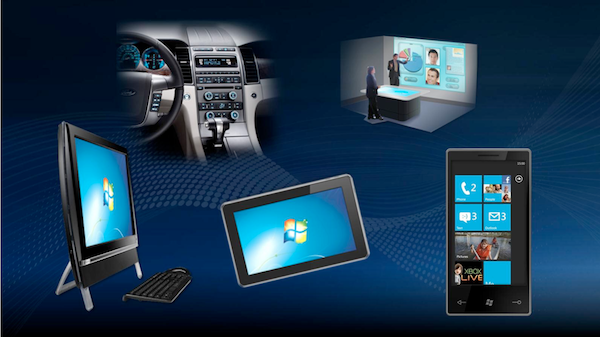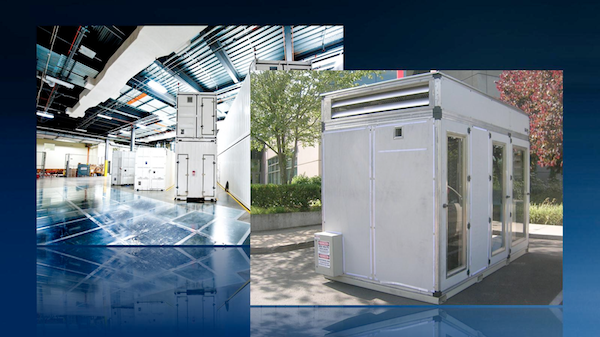Microsoft wants to park a cloud container in your driveway
Cloud computing dominated the morning's Microsoft Financial Analyst Meeting 2010 presentations. COO Kevin Turner and Chief Research Strategy Officer Craig Mundie spent more time talking cloud computing than any other topic. For Mundie, it was a bold departure from previous years, where he spoke broadly and almost exclusively about forthcoming technologies -- typically years from release, if ever. Last year, he asserted that the successor to the PC would be "a room."
Some reasons for Microsoft's cloud focus should be obvious:
1. Azure is available, as of six months ago.
2. Cloud computing is all the rage right now.
3. Microsoft recently released new hosted applications.
4. Competitors are rallying behind the cloud to runaround the Office-Windows-Windows Server applications stack.
5. Hosted apps let businesses offer employees anytime, anywhere, on-anything data access, while better protecting corporate information.
But there is another reason that might be less obvious: New sales. For core products Office and Windows, and increasingly SharePoint and Windows Server, Microsoft is reselling to the same customers. With these established products, the company doesn't have anything really new to offer. C`mon what's all that different between Office 2007 and 2010? Windows 7 is an easier upgrade because most businesses run 9-year-old Windows XP. But Microsoft is still selling to the same customers.
Azure and hosted Microsoft applications are new, fresh products with that familiar look and feel of the old stuff. Microsoft also can solve real-world problems: Helping businesses to meet mobile demands with lower privacy and security risks. It only takes one stolen or lost laptop containing millions of customer records to spoil a corporation's year. Cloud computing provides a means of giving employees greater mobility while holding data behind the firewall.

Mundie used "data authority" to describe Microsoft's approach. "The other thing that we look to the cloud for increasingly is to be the data authority," he told financial analysts. "And I think that will be true whether as a person or an institution you want to have one place where you believe you can put an authoritative copy of information or have it propagate around to all the appropriate applications or devices in your life or work environment."
From the "something new to sell" perspective, Mundie and Turner did more than tell financial analysts about emerging opportunities around the cloud. The executives made sales pitches to potential customers. After all, many of the financial companies represented in the FAM audience should be looking at adopting the kind of cloud services Microsoft offers -- sooner, rather than later. Surely Microsoft would also benefit from financial analysts satisfied with its cloud services. Wall Street's elite make more than recommendations about stock investments. They are IT influencers, even subtly. Satisfied customers are good evangelists.

Successful marketing is also about controlling the vernacular, something Microsoft attempted to do with "software plus services." Today Mundie put firmer spin on "client plus cloud as a computing platform"; the term "client plus cloud" isn't new for Microsoft, but both executives gave it a firm kick. Mundie explained:
Let me talk about role we think the cloud plays. Many people talked about it runs your applications or it's a piece of your infrastructure. But we think of it more broadly...The cloud is a place where we get to do the orchestration across all these myriad devices in your life, across a whole array of applications. The world that many of us have grown...as the mobile environment or personal computing or laptop computing environment were emerging were that each of them was a bit too much of an island. It was a very manual process to maintain the relationship and data and communication that you would ideally want among these devices. And as the number and type of devices grows essentially without bound, it would be a nightmare if this was left as an exercise to the user. So the cloud becomes a place where we can orchestrate the operation of these collection of devices and that will be a very, very important part of what makes this useful and interesting.
But "client plus cloud" isn't descriptive enough. Unless I misunderstood the executives, Microsoft is going into the big-iron hardware business. So "client plus cloud" has broader meaning. Mundie told FAM attendees they can explore a "prototype of a container" with 600 servers "sitting in the parking lot right outside." He explained what such a porta-server farm could do for them: "It's completely self-contained. You don't need chilled water. In fact, you just hook it up to your garden hose. You put in electricity and your fiber optic connection and you can be online...You'll be able to buy these things and just have them delivered in your parking lot and put it anywhere you want. This is the ability to combine the super scale capabilities that [Turner] alluded to and the knowledge and understanding that comes from that with the ability to do creative engineering."
Now that's a sales pitch.